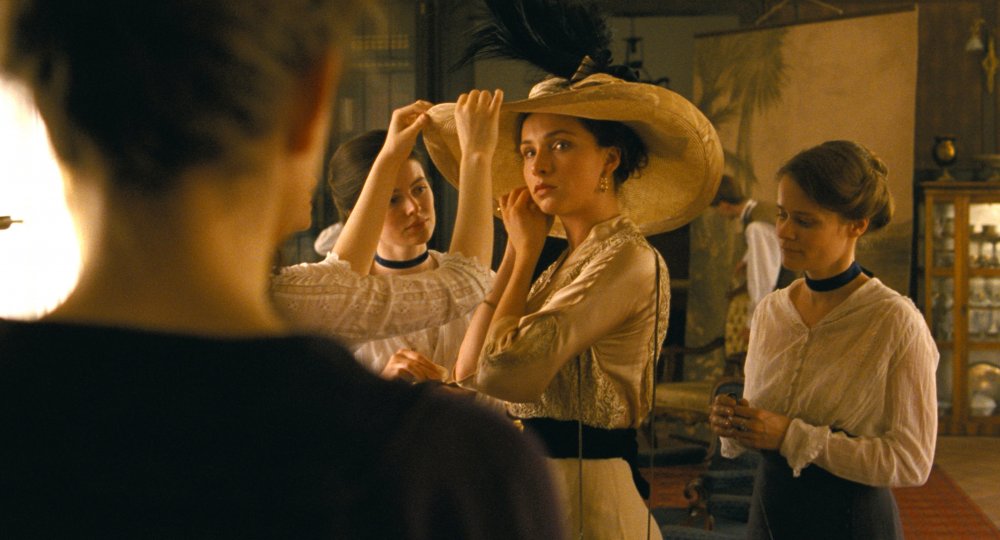SUNSET (Napszállta)
Sony Pictures Classics
Reviewed for Shockya.com & BigAppleReviews.net by: Harvey Karten
Director: Lázló Nemes
Screenwriter: Lázsló Nemes, Clara Royer, Matthieu Taponier
Cast: Juli Jakab, Vlad Ivanov, Evelin Dobos, Marcin Czarnik, Levente Molnr, Julia Jakubowska
Screened at: Sony, NYC, 1/31/19
Opens: TBD
The 1950s in America may be looked upon as perhaps the dullest decade of the 20th century but it was also the most prosperous. Politics then were relatively stable. In fact the biggest complaint about the two major political parties is that they were so much alike you could not tell them apart:like tweedeledum and tweedledee. How we wish that were true nowadays when not only the U.S. is divided (Obamacare passed without a single Republican vote), but also Europe with its Brexit, the rise of extreme nationalism, the politics of hate. With “Sunset,” Lázló Nemes unfolds an epic tale about even worse divisions in the Austro-Hungarian Empire, placing the drama in 1913 when the world’s first all-encompassing war was brewing. While the tale, told exclusively through the eyes of Írisz Leiter (Juli Jakab), tunes us into both the active and brewing violence in Budapest, we in the audience cannot be blamed for being confused as to the motives of the gun-wielding participants. At first we figure that the mayhem is based on class warfare: the masses of have-nots resenting the upper-bourgeois merchants whose products cater to the tastes of the aristocracy in the Austrian capital of Vienna. However, given that director Nemes’ previous offering, “Son of Saul,” opened through the point of view of inmate Saul, an Auschwitz prisoner made to bury the bodies of the murdered Jews, we can surmise that there is a Jewish theme in “Sunset” as well.
Here’s why. The backstory of “Sunset,” or “Napszállta in the original Hungarian, is that a high-class milliner’s store is burned to the ground, its two owners perishing in the flames. This looks like a foreshadowing of the Kristallnacht, when in 1938 Nazi thugs broke windows of Jewish-owned businesses, torched synagogues, raided Jewish homes and killed one hundred German-Jewish citizens. You may, of course, have a different interpretation: Nemes, not one to spoon feed the audience, will never tell.
Because of the director’s regard for the intelligence of his audiences, he gives us but an outline of the activities and bursts of anarchy in Budapest on the eve of war. At the same time, given that the film is 144 minutes long, coupled with that deliberate lack of clarity as to motivations of the warring groups, some prospective filmgoers will be exasperated. And others, like me, will be absorbed throughout.
As Leiter (a predominantly Jewish name), Jakab performs as a woman alone traveling from Trieste to Budapest in search of employment in her parents’ store but also following up a rumor that her brother Kálmán (also a Yiddish given name shortened from the Greco-Jewish name Kalonymos, can be located there. She never smiles but wears a fierce, determined look as anyone would while negotiating through the personalities of several men, in one instance almost the victim of gang rape. She seeks employment in the millenery establishment that had been owned by her parents but is now under the proprietorship of Oszkár Brill (the Romanian actor Vlad Ivanov). Though Brill does not hire her, he takes her under his wing as the city faces raids by outlaws, though most of the beatings and shootings take place off the set. (Correction: the action does not take place in a set as the director, fearing the loss of individuality and even a humane-ness in our digital world, refuses to use such a convention favored by current filmmakers.) Each time she mentions the name of her brother, it’s as though she has uttered an obscenity worthy of 50 lashes.
Though warned to stay close to the shop, she wanders off, crashing into what we today would call chaotic neighborhoods, including a look at Countess Redey’s (Julia Jakubowska) palace. The countess was allegedly driven mad by her husband, whose had implanted her back with evidence of severe whippings. Continuing to wander about she runs into more parlous situations, hopping a tram now and then, not deterred even after she is almost raped. At this point we surmise that the director, using a script from Clara Royer, Matthieu Taponier and himself, is using Írisz as an Everyman—the suffix “man” applicable to her given her androgynous look and our vision of her in a concluding scene surrounding by men in trenches.
Györgyi Szakács’s costumes are a high point. Women wear hats that could be used by discus throwers given the size of the head coverings, just as American men in the 50’s all wore Fedoras. Mátyás Erdély films in Hungary, specifically in Budapest and Iszkaszentgyorgy, the dust in the air rarely settling as though the town is a pre-war Beijing. Pay close attention, as though you were Írisz Leiter herself, looking in astonishment at a civilization in decay, preparing for a war that will break up the Austrian Empire, a prelude to the last strains of civilization.
144 minutes. © 2019 by Harvey Karten, Member, New York Film Critics Online
Story – B+
Acting – B+
Technical – A-
Overall – B+

